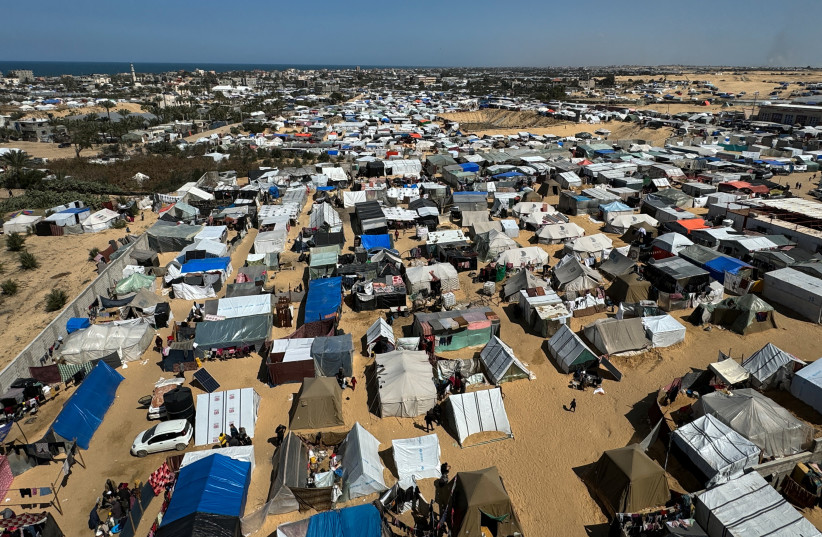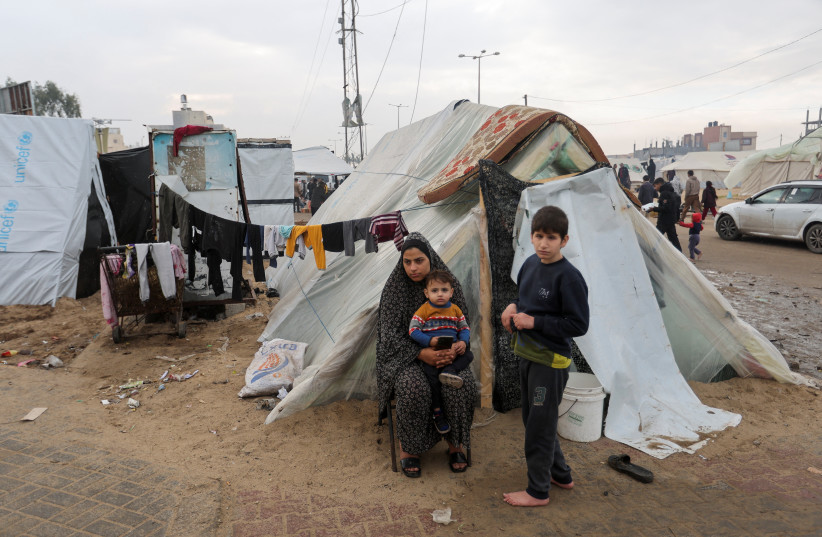Born in Gaza in 1997 to a family with six children, Hamza grew up and lived his entire life in the Rimal neighborhood of Gaza City. He got his bachelor’s degree in accounting at the Islamic University of Gaza in 2021 and then worked as an accountant for two years before escaping the enclave in August. The Jerusalem Post interviewed him from his place in exile, where he continues to share and create pro-peace and anti-Hamas content.
Hamza participated in the 2019 demonstrations against the Hamas rule that were violently quashed by the terrorist group and has written since then about his experiences in Hamas prisons, where he was accused of dissent and was subjected to various types of torture. He voiced opposition to Hamas’s tyrannical rule, oppression of various freedoms, and indoctrination.
Can you describe the situation in Gaza right now?
“If there was a single word to describe the main conditions in Gaza, it would be anarchy. The destruction of more than 70% of the infrastructure in Gaza resulted in more than 1.2 million people being displaced, most of them living in tents in southern Gaza in disastrous living conditions.”
Hamza also pointed to an issue unknown to many in Israel: that convicts were released en masse from Gazan jails as a result of Israel’s offensive. So now there is a lack of law enforcement in the enclave, on top of everything else. According to the peace activist, this paved the way for the establishment of several gangs, which work with Hamas to plunder humanitarian aid.
“Most people spend their days waiting for relief airdrops or in line to get food for their family. In the north (of the Strip), humanitarian conditions worsened along with the loss of connection to relatives in the south or outside of Gaza.”

When asked about his family, Hamza said they live in a temporary tent in Rafah, burning wood to heat their food. When we need to communicate, they must go near Rafah Crossing for an internet connection. I hope they can escape this nightmare and find a safer location soon,” he said.
Hamza said Hamas had been losing support in Gaza before October for a variety of reasons, including social and economic conditions, as evidenced by the number of emigrants who fled Gaza before the war and the anti-Hamas riots that took place in July. “Hamas’s leadership couldn’t find a better solution other than turning this anger to another enemy – Israel,” he said.
“I was eight years old when the Disengagement was implemented [in 2005],” he said. “It was the most significant step toward an independent Palestinian state in decades. I still remember how people in Gaza welcomed it and the ceasefire that ended more than five years of enmity between the Palestinian Authority and Israel,” Hamza reminisced, referring to the Second Intifada and Israeli Operation Defensive Shield that followed.
However, Hamza stressed that Hamas succeeded in branding the Disengagement as a “victory” for the resistance rather than a result of peace efforts or at least a push toward peace, which he attributes to a lack of a clear strategy and coordination.
Hamas then won in the enclave’s 2006 elections and the bloody coup against Fatah that followed. “Hamas’s revolution was unavoidable given the Palestinian Authority’s corruption and how they turned a blind eye to Hamas’s acts while recruiting, arming, and managing various organizations in Gazan society,” he said.
“Many of this war’s most significant hurdles, including the Hamas tunnels, are the result of postponing the solution by closing Gaza [off]. Hamas reintroduced the idea of creating tunnels, not only for smuggling goods and weapons but also as a military tactic.”
Hamza also expressed criticism of Israel. “The problem with past Israeli operations is that they weren’t serious enough to put an end to Hamas. That gave Hamas 17 years to expand their tunnels under almost every house and every street in Gaza; they became like cancer. Now, both Palestinians and Israelis are paying for this,” he said.
“I witnessed multiple Hamas crimes in Gaza, but what occurred on October 7 was far worse than any of them. I can’t see it as anything but a cruel attack on humanity,” the exiled peace activist said, adding that while he supports the goal of removing Hamas, “I am opposed to many of the IDF’s actions that [if they weren’t carried out] could save many lives, as well as statements made by some Israeli authorities. Eliminating Hamas is crucial, but saving the lives of both innocent Gazans and Israeli hostages is also critical.
“None of what has happened or is happening would be relevant without a plan for the day after,” he stressed, adding that it should be “developed by Israel, the restructured Palestinian Authority, the United States, and some Arab countries – to avoid the mistakes made in the 2005 Disengagement plan.”
How do you view a path to a solution for the conflict in general?
“It’s not easy to answer a question like this, but I believe that peace and coexistence won’t be applicable by [just] one party,” Hamza answered thoughtfully. “For that to happen, the Palestinian side should take significant steps to de-radicalize by reforming the educational system, renewing religious discourse, and investing their budget in providing jobs for their people. On the other hand, the Israeli government must be committed to withdraw from Gaza, the West Bank, and east Jerusalem.”
De-radicalization is a massive undertaking, but history has shown it is possible. “If you told anyone that Germany would be de-Nazified 90 years ago or the UAE would be de-radicalized ten years ago, they wouldn’t believe you. With the proper reforming of education and the renewal of religious discourse, I believe it can be accomplished.
“In my opinion, we should learn from the UAE’s experience on that and start making genuine efforts for rehabilitation, producing counter-content against terrorism, and providing them with more jobs to not be exploited by terrorists for money,” he said.
Are your views unique to your environment? Or do you think they represent a consensus?
“Feeding my people jihadist propaganda for 17 years was enough to influence their thoughts about peace to the point that calling for cohabitation seemed strange and undesirable. Still, many people believed in it, but the consequences and Hamas’s accusation of treason contributed to the silence and terrorization of many others,” Hamza said.
There have been multiple reports of Gazan civilians looting and being woven very closely in with the horrific acts Hamas committed, including holding hostages and beating kidnapped Israelis in the streets. Video footage has circulated, showing scenes of celebration of the massacre and videos of Gazans still rooting for the genocidal terrorist group.
“There is no doubt that Hamas managed to build a base of supporters in Gaza who were radicalized by listening, reading, and watching its agenda for years and to believe its leaders’ narrative that ‘there are no innocents in Israel.’ I feel ashamed because of them; I’m afraid to return to Gaza because of them,” he said.
“I want the people of Israel to know that there are many individuals in Gaza, including myself, who are opposed to these atrocities; if I were in Gaza, I would not talk about it – and many others would die if they did. Do not lose your hope for peace because of Hamas; it’s exactly what they want.”

Still, you portray some unique thoughts compared to the environment you grew up in. Do you consider yourself as having gone through a process of de-radicalization?
“I consider what happened to me as an individual experience. It started when I read a book titled Islamic Fascism by the great author Abdel-Samad Hamed. I continued by learning about the Holocaust and the history of antisemitism. I was shocked about what the Jews had to go through. Then I went on to read about the common history of Jews and Arabs in this territory and about Jewish history of thousands of years, which I had never heard of before,” Hamza said.
“After that, I vowed to disregard all I had heard about the Israelis and begin listening to them. I currently have numerous Israeli friends, both to discuss the Palestinian-Israeli issue and as personal pals.”
What would be your final message to our readers?
“First and foremost, I’d like to express my heartfelt sympathies to the families of those killed, as well as my solidarity with all of the victims and hostage families. Unlike what the Arabic media portrays, not all Gazans are Hamas or support their crimes; we are all victims of hate ideology. If there was only one motive to advocate for peace, it would be to deny these terrorists a chance” to destroy Israelis’ and Palestinians’ hopes for peace and their shared future “and to put an end to the conflict within our generation.”
